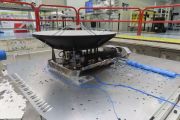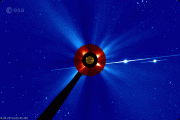
Copernical Team
ESA satellites track progress on Paris Agreement goals

As the United Nations COP30 climate change conference convenes in Belém, Brazil, the world's attention will turn to the heart of the Amazon rainforest – a region that symbolises both hope and concern in the fight against climate change.
Once considered one of Earth's most vital carbon sinks, the Amazon is now showing troubling signs – satellite observations reveal that parts of this vast ecosystem are no longer absorbing carbon dioxide as they once did. In some areas, the forest has even become a net source of carbon emissions.
Week in images: 03-07 November 2025

Week in images: 03-07 November 2025
Discover our week through the lens
New Copernicus Satellite Strengthens Earth Observation Programme
 The Copernicus Sentinel-1D satellite was successfully launched on November 4, 2025, at 22:02 CET from French Guiana using an Ariane 62 rocket. Sentinel-1D joins the Copernicus programme, providing essential data for environmental monitoring, infrastructure assessment, and disaster response.
The Sentinel-1 mission now features two identical satellites in orbit, imaging Earth's surface every
The Copernicus Sentinel-1D satellite was successfully launched on November 4, 2025, at 22:02 CET from French Guiana using an Ariane 62 rocket. Sentinel-1D joins the Copernicus programme, providing essential data for environmental monitoring, infrastructure assessment, and disaster response.
The Sentinel-1 mission now features two identical satellites in orbit, imaging Earth's surface every Ancient mantle revealed by 3.7-billion-year-old rocks in Australia
 Researchers at the University of Western Australia, along with colleagues from the University of Bristol, the Geological Survey of Western Australia, and Curtin University, examined feldspar crystals from anorthosite rocks found in the Murchison region of Western Australia. These rocks, dated at 3.7 billion years old, are confirmed to be the oldest on the Australian continent and among the earli
Researchers at the University of Western Australia, along with colleagues from the University of Bristol, the Geological Survey of Western Australia, and Curtin University, examined feldspar crystals from anorthosite rocks found in the Murchison region of Western Australia. These rocks, dated at 3.7 billion years old, are confirmed to be the oldest on the Australian continent and among the earli The threat of space terrorism is no longer science fiction, but we're ill-prepared to combat it
 As satellite technology surges ahead and space becomes increasingly accessible to private and state actors alike, the new and unsettling threat of space terrorism looms above Earth's atmosphere.
Once the domain of science fiction, the idea of terrorist activity in outer space is now a growing concern among experts.
The democratisation of space has not only opened the door to innovati
As satellite technology surges ahead and space becomes increasingly accessible to private and state actors alike, the new and unsettling threat of space terrorism looms above Earth's atmosphere.
Once the domain of science fiction, the idea of terrorist activity in outer space is now a growing concern among experts.
The democratisation of space has not only opened the door to innovati BlackSky signs contract exceeding 30 million dollars to supply Gen-3 ISR for defense client
 BlackSky Technology Inc. has secured a multi-year contract worth over 30 million dollars to integrate its Gen-3 high-cadence tactical intelligence, surveillance, and reconnaissance (ISR) services into the secure operational environment of a strategic international defense customer.
The program aims to boost sovereign space-based intelligence capacities by leveraging BlackSky's commercial t
BlackSky Technology Inc. has secured a multi-year contract worth over 30 million dollars to integrate its Gen-3 high-cadence tactical intelligence, surveillance, and reconnaissance (ISR) services into the secure operational environment of a strategic international defense customer.
The program aims to boost sovereign space-based intelligence capacities by leveraging BlackSky's commercial t Insects on the space menu

Long before humans reached orbit, insects had already shown they could handle the hurdles of spaceflight. Light, highly adaptable and nutritionally rich, these resilient animals present an attractive option for European researchers studying reliable food sources for long-duration missions.
Earth from Space: Branco River, Brazil
 Image:
Ahead of the 30th UN Climate Change Conference of the Parties (COP30) taking place in Belém, Brazil, from 10-21 November, this IRIDE image shows the Branco River and its surrounding forests in the Brazilian state of Roraima.
Image:
Ahead of the 30th UN Climate Change Conference of the Parties (COP30) taking place in Belém, Brazil, from 10-21 November, this IRIDE image shows the Branco River and its surrounding forests in the Brazilian state of Roraima. FSU physicists discover new state of matter in electrons, platform to study quantum phenomena
 Electricity powers our lives, including our cars, phones, computers and more, through the movement of electrons within a circuit. While we can't see these electrons, electric currents moving through a conductor flow like water through a pipe to produce electricity.
Certain materials, however, allow that electron flow to "freeze" into crystallized shapes, triggering a transition in the stat
Electricity powers our lives, including our cars, phones, computers and more, through the movement of electrons within a circuit. While we can't see these electrons, electric currents moving through a conductor flow like water through a pipe to produce electricity.
Certain materials, however, allow that electron flow to "freeze" into crystallized shapes, triggering a transition in the stat First evidence of Ice XXI phase observed at extreme pressure and room temperature
 The Korea Research Institute of Standards and Science (KRISS) has observed for the first time the multiple freezing-melting process of water at room temperature under ultrahigh pressures exceeding 2 gigapascals and on a microsecond timescale. This has resulted in the discovery of a previously unknown crystallization pathway and the identification of a new ice phase named Ice XXI.
Ice gener
The Korea Research Institute of Standards and Science (KRISS) has observed for the first time the multiple freezing-melting process of water at room temperature under ultrahigh pressures exceeding 2 gigapascals and on a microsecond timescale. This has resulted in the discovery of a previously unknown crystallization pathway and the identification of a new ice phase named Ice XXI.
Ice gener 



































